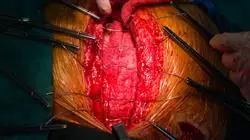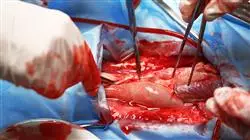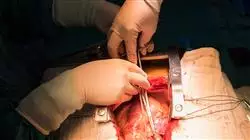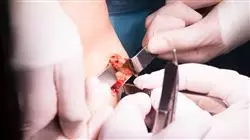University certificate
The world's largest faculty of medicine”
Description
Scientific evidence and constant education of the physician increase the quality of surgical practice. Keeping up to date is key to providing better care to our patients”

Plastic and Reconstructive Surgery has experienced exceptional development in recent years. This branch of Plastic Surgery, which deals with the repair of abnormal body structures caused by congenital irregularities of development or growth, damage caused by trauma or accidents, infections, or tumor diseases, which may include amputations or extensive ablations, is undoubtedly booming and requires fully qualified and prepared professionals to respond to the needs of patients in this regard.
This is why TECH's professional master’s degree in Plastic and Reconstructive Surgery offers specialized knowledge in this field and aims to promote the acquisition of new knowledge through a multidisciplinary approach that helps physicians in their daily practice and enables them to practice in different scenarios.
To achieve this, this high-level educational program has university and clinical specialists with extensive experience in the fields of Plastic and Reconstructive Surgery, Maxillofacial Plastic and Reconstructive Surgery, Cosmetic Gynecology and Infectious Diseases, a field of special importance in the monitoring and treatment in the postoperative period. This team of professionals will take the lead in preparing students to become prestigious surgeons in this field.
In terms of content, the professional master’s degree in Plastic and Reconstructive Surgery facilitates the acquisition of specialized knowledge about the latest advances in this field of work and consolidates the current postulates in this branch of study. All this will be of great help to the professionals, since it will allow them to solve multiple problems that arise in the practice of medical care.
Likewise, the program expands the field of research related to Plastic and Reconstructive Surgery, ensuring first-class theoretical-practical learning based on real experiences, as a result of the practical experience of the professors who teach the program.
Everything through a 100% online program that makes it easier to balance studies with the rest of the daily activities in the surgeon's life. Therefore, physicians will only need an electronic device (Smartphone, Tablet or PC) with an Internet connection to open up a wide range of knowledge that will enable them to position themselves as a professional of reference in the sector.
The professional master’s degree in Plastic and Reconstructive Surgery contains the most complete and up-to-date scientific program on the market"
This professional master’s degree in Plastic and Reconstructive Surgery contains the most complete and up-to-date Scientific Program on the market. The most important features of the program include:
- Development of more than 80 clinical cases, recorded with POV (Point of View) systems from different angles, presented by experts in surgery and other specialties
- The graphic, schematic, and practical contents with which they are created, provide scientific and practical information on the disciplines that are essential for professional practice
- Presentation of practical workshops on procedures and techniques
- An algorithm-based interactive learning system for decision-making in the clinical situations presented throughout the course
- Action protocols and clinical practice guidelines, which cover the most important latest developments in this specialist area
- All of this will be complemented by theoretical lessons, questions to the expert, debate forums on controversial topics, and individual reflection assignments
- Special emphasis on evidence-based medicine and research methodologies in surgical procedures
- Content that is accessible from any fixed or portable device with an Internet connection
This professional master’s degree may be the best investment you can make when selecting a refresher program, for two reasons: in addition to updating your knowledge of Plastic and Reconstructive Surgery, you will obtain a qualification from TECH Global University”
The teaching staff includes a team of healthcare professionals, who bring their experience to this program, as well as renowned specialists from leading scientific societies.
Its multimedia content, developed with the latest educational technology, will allow the surgeons a situated and contextual learning, that is, a simulated environment that will provide an immersive learning programmed to prepare in real situations.
This program is designed around Problem-Based Learning, by means of which the surgeon must try to solve the different professional practice situations that arise during the course. For this purpose, you will be assisted by an innovative interactive video system created by renowned experts in the field of Plastic and Reconstructive Surgery, with extensive teaching experience.
It is the best educational program on the market for its quality-price ratio"

Improve your surgical practice with this specialized program"
Objectives
The most prestigious professionals in the field of Plastic and Reconstructive Surgery have designed this comprehensive refresher program with the aim of ensuring that physicians in the sector are up to date with new scientific and technical knowledge in the field of reconstructive cosmetic surgery. This program, which aims to update surgeons’ professional skills and promote the acquisition of new skills and abilities, will be the professional's main asset when it comes to successfully entering a sector that continues to demand specialized professionals in this field.

This program will generate a sense of security in the performance of surgical practice and help you grow professionally"
General Objectives
- Study theoretical principles of Reconstructive Surgery
- Develop specialized knowledge about the different techniques and their uses in medical practice
- Evaluate the psychological aspects of Reconstructive Surgery patients
- Correctly approaching the resolution of facial lesions
- Assess the different reconstructive options for eyebrows, eyelids, nose, ear and lips
- Examine the theoretical basis for facial soft tissue reconstruction
- Analyze the use of prosthetic material in facial reconstruction
- Identify the different types of facial fractures
- Establish treatment plans for different types of facial fractures
- Examine the theoretical basis for the management of facial fractures
- Specify alternatives for surgical resolution of facial fractures
- Analyze the main reconstructive techniques in congenital malformations
- Study the main thoracic congenital malformations
- Analyze the anatomy of the thoracic region from a surgical approach
- Develop breast reconstruction techniques
- Develop specialized theoretical and practical knowledge on the care of patients with cleft lip and palate
- Analyze the protocols for multidisciplinary management of patients with cleft lip and palate
- Determine multidisciplinary treatment of patients with cleft lip and palate
- Analyze the physiological implications affecting abdominal reconstruction
- Approach the anatomy of the region from a surgical approach
- Compile the main flaps and their uses in abdominal wall reconstruction
- Determine the most common causes of pathologies that require the use of Reconstructive Surgery
- Provide an overview of the current state of the art techniques for reconstruction of sequelae in burn patients
- Increase specialized knowledge in relation to new techniques
- Fundamentals of the most advanced techniques in Reconstructive Plastic Surgery
- Propose updates that contribute to the current practice of Reconstructive Surgery in the treatment of burn patients
- Address truncal anesthesia techniques
- Analyze tendon suturing techniques
- Evaluate the flaps used in limb reconstruction
- Introduce limb replanting techniques
- Developing types and techniques of bone grafting
- Provide an overview of the status of genital reconstruction
- Develop specialized knowledge on new techniques and advances in the field of Genital Reconstruction
- Propose updates that can contribute to the current practice of Reconstructive Surgery
- Analyze surgical site infections
- Identify current predisposing factors in surgical site infections
- Compile preventive measures for surgical site infections
- Propose the adequate management of surgical site infections
Specific Objectives
- Examine the historical background of Reconstructive Surgery
- Analyze the evolution of Reconstructive Surgery
- Determine the characteristics of the skin and its relevance in Reconstructive Surgery
- Address the use of the most relevant techniques for Reconstructive Surgery
- Show the usefulness of microsurgery in Reconstructive Surgery
- Justify the use of flaps in Reconstructive Surgery
- Specify the usefulness of the use of grafts in Reconstructive Surgery
- Delve into the importance of understanding the psychological aspect of Reconstructive Plastic Surgery patients
- Analyze possible solutions for eyebrow lesions
- Specify the surgical options for eyelid surgery
- Determine the correct steps in nasal reconstruction
- Examine the most advanced surgical techniques for pinna reconstruction
- Propose useful techniques in post-traumatic facial reconstruction
- Introduce the common causes of facial injuries and their surgical solution
- Identify common tumors conducive to facial reconstruction
- Systematically and comprehensively examine the patient with facial fractures
- Define the etiology of facial fractures
- Provide accurate diagnoses in the facial trauma patient
- Assess appropriate alternatives for the resolution of various facial traumas
- Propose treatment plans according to the particular characteristics of each case
- Support the design of treatment plans based on the knowledge obtained
- Develop the ideal reconstructive surgical treatment in the facial trauma patient
- Identify the complications generated in the management of patients with facial trauma
- Examine the characteristics of the most frequent congenital syndromes in thoracic reconstruction
- Compile the reconstructive theoretical bases applicable to thoracic reconstruction
- Analyze breast surgical anatomy for reconstruction of the thoracic region
- Identify the most frequent pathologies in reconstruction of the thoracic region
- Determine the primary steps for breast reconstruction
- Propose the use of muscle flaps for thoracic and breast reconstruction
- Establish the possible techniques for chest wall reconstruction
- Examining the anatomical characteristics of patients with cleft lip and palate
- Define the etiological factors of cleft lip and palate
- Present the classification of cleft lip and palate
- Propose treatment plans according to the particular characteristics of each case
- Establish the advantages and disadvantages of the various surgical techniques for the correction of cleft lip and palate
- Support the design of treatment plans based on the knowledge obtained
- Develop criteria for the use of reconstructive techniques in the abdominal wall
- Demonstrate the use of synthetic material for abdominal wall reconstruction
- Establish steps for planning abdominal wall repair
- Propose useful techniques for the reconstruction of the abdominal wall
- Introduce the anatomical basis for the choice of abdominal flaps
- Specify the importance of the initial choice of the correct reconstructive techniqu
- Identify factors affecting the success of the reconstructive option
- Review the most recent papers and publications
- Determine the most frequent benefits and/or complications of current techniques
- Examine the effectiveness of current techniques
- Propose aspects of improvement in the field of currently used aesthetic or reconstructive surgeries, including skin culture for grafting treatment
- Assessing the psychological impact of these surgical actions on the people undergoing surgery
- Examine upper and lower limb regional anesthetic block techniques
- Analyze the new tendon sutures proposals
- Determine the types and techniques of flaps used in upper limb reconstruction
- Generate specialized knowledge on musculoskeletal reconstruction and neural repair in limb replantation
- Examine finger and upper and lower limb replantation techniques
- Develop the types and techniques used in the different types of bone grafts and osteoinductive materials
- Review the most recent papers and publications
- Determine the most frequent benefits and/or complications of current techniques
- Examine the effectiveness of current techniques
- Propose new actions to improve the currently used aesthetic or reconstructive genital surgeries
- Assessing the psychological impact of these surgical actions on the people undergoing surgery
- Develop current aspects of microbiology applied to surgical site infections
- Analyze the pathophysiological aspects and classification of surgical site infections
- Identify risk factors and severity in surgical site infections
- Compile effective preoperative, operative and postoperative preventive measures
- Establishing antibiotic prophylaxis and its main aspects
- Generate strategies for pharmacological and surgical management of SSIs
- Examine the most frequent infections associated with the most commonly used materials in Reconstructive Surgery

Our goal is to achieve academic excellence and help you achieve it too”
Professional Master's Degree in Reconstructive Plastic Surgery
Reconstructive plastic surgery stands out as one of the most relevant areas of medicine today, being constant methodological, research and technological efforts applied to the search and improvement of the effectiveness of their procedures. This situation has led this specialty to become a field of continuous development and evolution. Understanding the academic update as an indispensable value for doctors interested in staying abreast of developments in the area, in TECH Global University we have prepared our Professional Master's Degree program in Reconstructive Plastic Surgery. This postgraduate course will pay special attention to the new surgical techniques of graft and flap placement used in modern processes of nasal reconstruction. Likewise, we will delve into the modernization of the following aspects: knowledge of the different procedures used for reconstruction and neural recovery in limb reimplantation processes; and the identification of the different treatment alternatives in cases of mandibular fractures.
Study an Online Professional Master's Degree in Reconstructive Plastic Surgery
The large number of surgical intervention alternatives available to professionals specialized in reconstructive plastic surgery require, for their adequate choice and development, a high level of medical criteria and preparation. In our Professional Master's Degree program you will learn about the practical and methodological trends that will determine the future of reconstructive plastic surgery. Likewise, in this postgraduate program you will deepen in the update of the following topics: identification of the different reconstructive techniques used in the care of radiation burns cases; the various elements and aspects to be considered in the approach of the main complications of a thoracic reconstruction process with pectoral flap.







